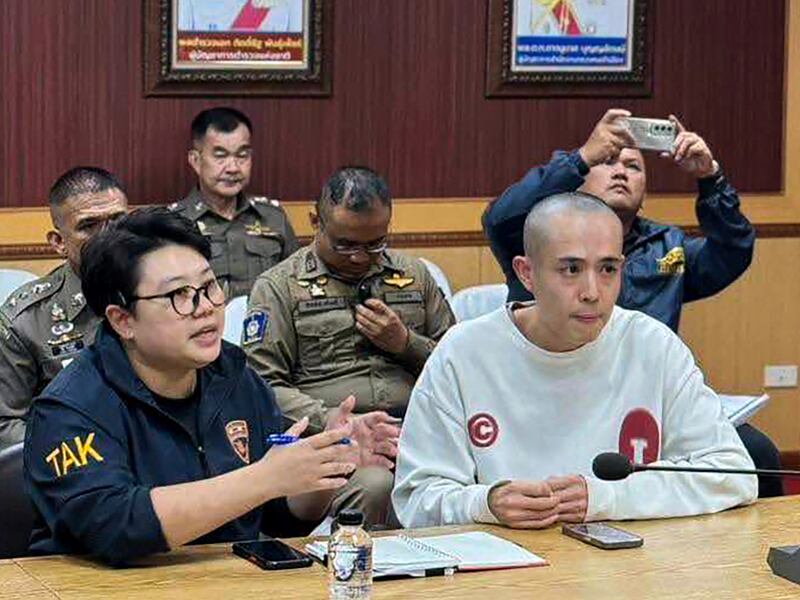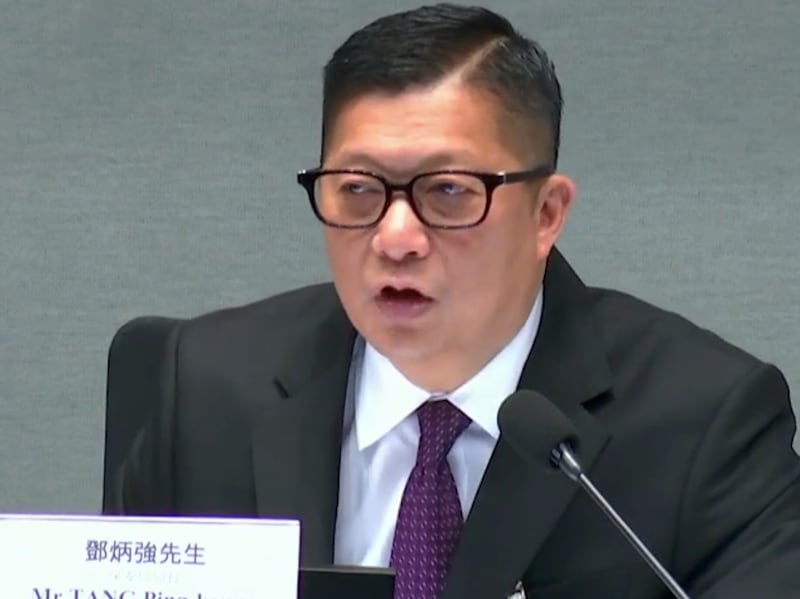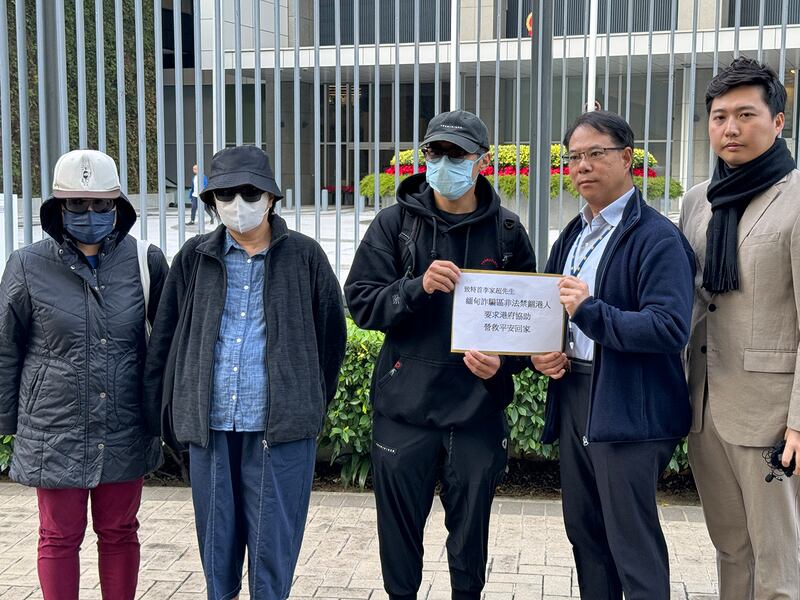Hong Kong authorities have sent a task force to Thailand in a bid to rescue an estimated 12 victims of Myanmar’s notorious scam parks, citing a “resurgence” in criminal activity targeting the city’s residents.
“Since the second quarter of 2024, there have been signs of a resurgence in the situation where Hong Kong residents are suspected of being lured to Southeast Asian countries and detained to engage in illegal work,” the Security Bureau said in a statement on Sunday.
The move follows the high-profile rescue of Chinese TV actor Wang Xing from the notorious KK Park scam facility in Myawaddy, near the border with Thailand.
Wang arrived back in Shanghai on Jan. 11, saying he had “returned to the embrace of the motherland,” and thanking his girlfriend and law enforcement officials who had helped make his rescue happen.

Wang was freed from a growing network of scam centers that has ensnared thousands of human trafficking victims from all over Asia — and as far away as Africa.
They are being held hostage in enclaves in Cambodia, Laos and Myanmar, despite some attempts at rescue by the authorities. Former victims have said they were lured in by false advertisements and forced to scam other people, then tortured if they refused to comply.
At these scam centers, they are forced to convince people they call or contact online to invest in bogus investments -- then make off with their money.
The Hong Kong authorities have received a total of 28 requests for assistance, 16 of whom have already returned to Hong Kong, and said that the task force would try to get the remaining 12 out of the hands of scam operators.
“The remaining 12 cases reported restrictions on their movement but were still safe and able to contact their families or the task force,” the Jan. 12 statement said.
Relatives say many of the Hong Kong victims are joining thousands of captives at KK Park, a Chinese development project that has become a notorious center for scam operations.
The Hong Kong task force will meet with Chinese Embassy representatives and Thai officials to “exchange intelligence and request the relevant authorities to assist as much as they can in the rescue of those assistance seekers,” it said.
Rescuing victims
While the actor Wang’s case put a spotlight on victims from China and Hong Kong, countries that host the scam centers — all China-friendly authoritarian states — have come under pressure to rescue their citizens who’ve become victims.
A police official in the Golden Triangle Special Economic Zone in northern Laos, a hotbed of scammers and traffickers, told Radio Free Asia a crackdown there had eliminated 306 scam centers — 88% of the known total — and deported 1,368 Chinese workers in the past two years.
“We are keeping our eyes on the remaining 12%,” the officer told RFA Lao.

However, even as these scam centers are shut down, others are likely to pop up elsewhere.
Kannavee Suebsang, a Thai lawmaker involved in efforts to rescue 19 Lao citizens trapped in a call center in Myanmar, said Thailand was being hurt by the use of its territory for human trafficking. The Wang Xing case showed that China can get results, so Bangkok should seek help from Beijing, he said.
“If we don’t do anything to help, Thailand will have a bad reputation. It may affect our trade, investment, tourism and foreign relations,” he told RFA Lao.
“Still huge”
The move comes after China’s Ministry of Public Security said it had arrested 53,000 Chinese nationals involved in Myanmar scam operation, and that the Four Families crime syndicate in the northern Myanmar region of Kokang had been destroyed, and cases were now going to court.
The ministry press conference detailed a massive and “well organized” cross-border operation involving massive participation from partners inside China, who promote, develop and update their schemes for luring unsuspecting jobseekers to Thailand or Myanmar, where they are kidnapped and made to work pending a ransom from their families.

“The scammers keep up with social trends and cater to personal preferences,” vice minister Zhang Ming told a Jan. 10 news conference in Beijing. “They tailor fraud scripts for people of all ages, professional backgrounds, and educational levels, and they deceive a huge number of people.”
It said that despite the ongoing crackdown on cross-border scam operations by China, the scale of the scam parks is “still huge.”
“Scam operations are using new technologies like blockchain, virtual currencies, and AI to continually update and upgrade the tools of their criminal trade,” Zhang said.
A Golden Triangle SEZ call worker told RFA Lao that after a sweeping government crackdown last August, some call centers have reopened, and are hiring speakers in the Thai and Burmese languages.
“I went back home and now I’m back. They asked me to come back,” the worker said. “My job is to chat in Thai.”
The SEZ police officer said some call centers discovered in the Lao government crackdown but not shut down “are in the middle of switching from call centers to online casinos” and are being monitored see if they have actually shut the scam call centers.
But a Lao job recruiter told RFA that online gambling operations are no necessarily better that scam call centers.
“The tasks are not different between the online gambling and call center. They use different apps,” she said.
RELATED STORIES
Facing crackdown, Chinese scam gangs in Myanmar relocate to lawless Kayin township
Plea for help from telephone scam victims falls on deaf ears among Chinese officials
Scammers lure jobseeking Hong Kongers to Myanmar from Japan, Taiwan
Chinese nationals living in Thailand said Chinese state-owned companies are behind scam operations in Myanmar, and behind them is the ruling Chinese Communist Party’s United Front Work Department.
“Wherever you have these scam parks, you will find Chinese companies plying the biggest trade,” a realtor who gave only the surname Pan for fear of reprisals told RFA Mandarin in a recent interview. “The Myawaddy park was built by Chinese state-owned companies.”
“They started up these operations to get themselves going, because they make money really fast,” Pan said, adding that the parks were the criminal face of the ruling Chinese Communist Party’s United Front outreach and influence operations.
“The operators share some of the proceeds, but all of the big bosses are back in China,” he said.
Long-term Myanmar resident Li Tengchong agreed.
“The investors in these scam parks are basically [Chinese] state-owned enterprises,” Li told RFA Mandarin in a recent interview. “Behind the scenes, all of the bosses are presidents of local Chinese chambers of commerce, and they have ties to United Front Work Departments in various parts of China.”
“All of these people are linked to the Chinese government.”
Clout in Bangkok
The relative of a Hong Kong scam park victims who gave only the nickname Calvin for fear of reprisals said his family member has been trapped in a scam park for more than six months.
“At least they are taking practical action now, instead of just words,” he told RFA Cantonese in a recent interview.
Former Yau-Tsim-Mong District Council chairman Andy Yu, who has previously helped Hong Kong families with loved ones in KK Park, said the rescue attempt would depend on how much clout the Hong Kong government could wield in Bangkok.
“It really depends on how much bargaining power the Hong Kong government, the Chinese government and the Thai government have,” Yu said, saying he was doubtful that they could get the victims out as quickly as Wang Xing had been rescued.
“They should be able to get them home in three or four days, but it’s not clear whether this level of power can be wielded to help [Hong Kong] victims,” he said.
The Hong Kong government currently has a yellow outbound travel advisory in place for Thailand and Myanmar, warning of “signs of threat,” but the advisories don’t mention the scam parks.
Meanwhile, an online document listing more than 1,000 Chinese victims of human trafficking has been censored from the country’s tightly controlled internet, according to the citizen journalist account “Mr Li is not your teacher.”
The document contained comments from relatives of those missing saying that Chinese police hadn’t even begun an investigation when they reported their disappearance, the X account said.
Translated and edited by Luisetta Mudie. Additional reporting and translation by RFA Lao. Edited by Paul Eckert and Malcolm Foster.
